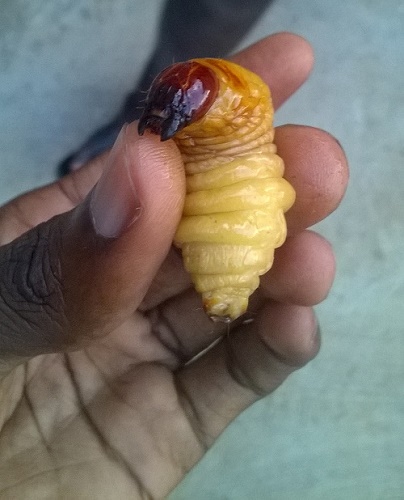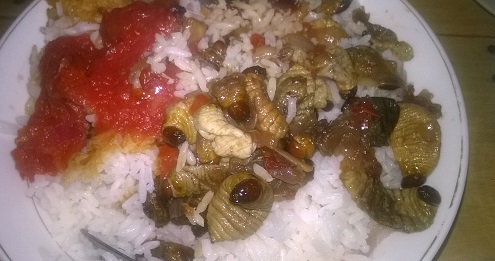Ansah Boatemaa is an environmental activist in Cape Coast, Ghana. She is the Programs Manager for Green Africa Youth Organization in Ghana and a teaching assistant at the University of Cape Coast. She is passionate about food security and climate change. Agricultural waste management and climate smart agriculture – aiming at combating climate change through sustainable agricultural methods, are my research interests.
Together with the entire Green Africa Youth Organization, we came up with this project which focuses on introducing insect (Rhynchophorus spp) farming in Ghana and envisions a cheap, readily available nutritious source of food for local impoverished communities.
Palm weevils, Rhynchophorus spp, are excellent low cost sources of essential nutrients. They have low carbon footprint if farmed as a commercial enterprise. In Ghana, Palm weevils serve as a traditional meal for natives of most rural societies (especially within the southern sector) but are not farmed for consumption. Palm weevil farming is a cost-effective enterprise in terms of supplies and labour. The larvae reaches maturity within three to four months and can be harvested for consumption – very rich in protein.
The project will partner with the Department of Wildlife and Entomology of the University of Cape Coast to provide students and researchers insight on insect farming for human consumption in Ghana. Also, Traditional Leaders, Local Government Representatives of Communities, Local Trade Union, Palm Farmers and Palm Wine Tappers within the community will be integrated as stakeholders to ensure project sustainability and effectiveness.
Palm trunks, which are regarded as agricultural waste, will be used for farming to provide larvae stage of the Rhynchophorus spp (consumable) with a natural habitat. The trunks will be cut into logs. The logs will be fed with fermented palm mash, upon which adult palm weevils will be introduced to mate and produce eggs. Feeding activity and entire life cycle of the immature stages (eggs, pupae and larvae) are harboured in the palm trunk. After about 4 months, the first lop of weevils will be ready for harvesting.

Image II: Matured larvae for human consumption.
Prior to the first harvest of the farm, the entomology department will give scientific insight, and ensure the ecological health and quality of the habitat to be provided for the palm weevils. As a delicacy, unemployed youth will be trained on how to prepare palm weevil larvae as food for trade. This will be done through a workshop for community members. The project is long term and very sustainable. Income generated from harvest will be used to further the project and scale up in other rural communities. Eventually, it is expected that the project reaches all rural areas – providing affordable food and alternative livelihood.

Image II: Palm weevil larvae used in cooking rice.
The farming technique is cost effective and environmental friendly as it utilize agricultural waste as a resource and enhance food security. Moreover, the mash used in rearing the larvae is rich in nutrients and will be sold as compost for crop farmers in amending infertile soils. Also, after six months, the hollowed palm logs used for rearing and have been burrowed by the larvae will be utilized as containers for gardening and growing ornamental plants.
This project was developed and inspired to combat chronic malnutrition in rural areas within the Ashanti and Central Regions of Ghana. There is no interest by farmers to farm palm weevils due to lack of skills and technical knowhow. The project will provide skills and knowledge of Palm weevil farming and trading to communities and create alternative livelihood for dwellers.
The project’s success will be measured by: the availability of affordable nutritious food (palm weevils) to rural communities, number of youth engaged in palm weevil farming and trade as alternative livelihood, income generated from first harvest of the farm which will also indicate the number of consumers. Additionally, impact measurement will also include the number of crop farmers interested in purchasing the nutrient-rich compost for farming following eventual usage of palm trunk as habitat for palm weevil larvae.
The project is currently seeking partners, sponsors and technical support. We will be glad to have you on board. Contact Us.
Written by: Ansah Boatemaa.

Very good am interested in this project am in nigeria
LikeLike
Is this training ongoing? Please I would love to be trained. Please reply.
LikeLike
…& I am in Nigeria.
LikeLike
I AM A NIGERIA , I WIL LIKE TO BE TRAIND
LikeLike
I want to learn how to farm wood worm (beetle larvae) can you teach me ?
LikeLiked by 1 person
I am interested in this project. I am a Ghanaian and will like to get in touch with you soonest as my NGO will also have a keen interest in this project.
LikeLike